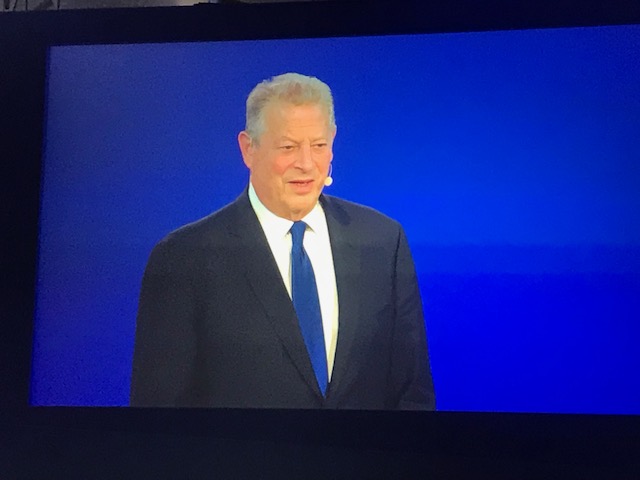
Al Gore Should Be Knighted
Al Gore in front of a packed house in the heads of states plenary room at COP26 just gave the best talk I’ve heard on any subject – hands down. For 45 minutes non-stop with rapid fire graphics, videos and script-less details on extreme weather events across the world and their impacts (including some from a week or a month ago), he painted a real picture of the a encompassing breadth and severity of the climate crisis…you could’ve heard a pin drop. He then built up the hope side with solutions, data-supported trends on renewable energy pricing and investments, and with the clarity of someone who has deep-dived studied this topic for decades. Al Gore called out the World Bank for its ineffective and inadequate response to the climate crisis; called recycling a farce and an ineffective practice that needs to be replaced by targeting the top plastics producers around single use; discussed the Climate Trace report on China increasing coal plants by more than the rest of the world; praised the 100 countries that signed the global methane pledge at COP26; made the case for financial investments and returns in the decarbonization sector; exploded the ineffectiveness of methane capture while advocating for new carbon capture technology; and stated that carbon markets can play a role but should be the last resort for countries (counting toward the last 95% of their net zero efforts) rather than offering a get out of jail card. Sir Al Gore!
Green Hydrogen Emerging from Obscurity
Three CEOs from companies in the green hydrogen market discussed the inevitability of green hydrogen to replace fossil fuels in the shipping, steel and mining industries, and the opportunities for scaling up this game-changing technology. The all agreed that the private sector in green hydrogen doesn’t need subsidies or R&D money – they got that – but rather government policies on the demand side that pave the way for its future and lessen the risk for big players to make the necessary investments. One of the biggest projects on the books is a new 10GW green hydrogen project in Mauritania which includes Africa’s first offshore wind farm.
Getting Closer
Scientists say global warming must be kept to 1.5 degrees above pre-industrial levels to avoid the worst impacts of climate change, and the goal of COP26 is to keep that target in reach. The International Energy Agency reported Thursday that warming could be limited to 1.8 degrees Celsius above pre-industrial levels by 2100, if all COP26 commitments made as of Wednesday night are fulfilled on time. It’s big news for COP26, since the UN reported in September the planet is careening toward 2.7 degrees. That analysis included countries’ pledges before COP26, but didn’t include the most recent developments.
Climate Smart Agriculture
U.S. Agriculture Secretary Tom Vilsack hosted a COP26 forum at the U.S. Center on Climate Smart Agriculture which discussed a new push to support farmers and ranchers in reducing emissions and sequestering carbon in cost effective ways. Technology and strategies to minimize methane were discussed, along with providing farmers and ranchers with financial incentives for verifiable carbon emissions reductions. The initiative is a “carrot” and not policy approach complete with measurement and verification tools, incentives (paying farmers for reducing carbon), support and guidance on reducing carbon while preserving the bottom line. Panelists emphasized that government should provide the framework for decarbonizing agriculture, support the establishment of voluntary carbon markets, and support strategies that are not “one size fits all” and provide solution options that meet the contexts of different farms. Note: Not once was local food production for local consumption discussed.
Nuclear as a Piece of the Puzzle?
If you are an environmentalist, the word “nuclear” has bad connotations. And for good reason. We’ve had three significant accidents in Russia, the U.S. and Japan that were frightening. NGO Nuclear advocates at COP26 argue with data that deaths from nuclear are more in the ballpark of deaths from renewable energy over history, and that fossil fuel related deaths far exceed nuclear-related deaths and that nuclear can be a viable clean energy option in the total mix. Increasing small modal safety technologies are evolving, and the total land space needed per unit of nuclear energy is significantly smaller than solar or wind. That being said, aside from Bill Gates in his book “How to Avoid a Climate Disaster”, I’m not hearing a lot of chatter on this one.
-Gary Cuneen
